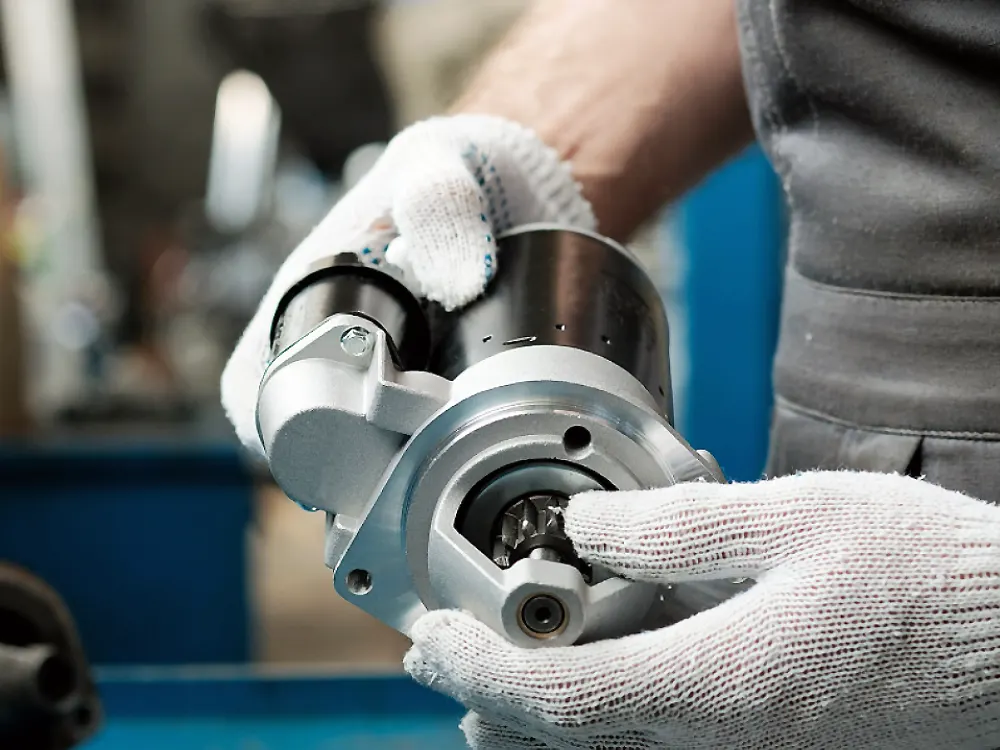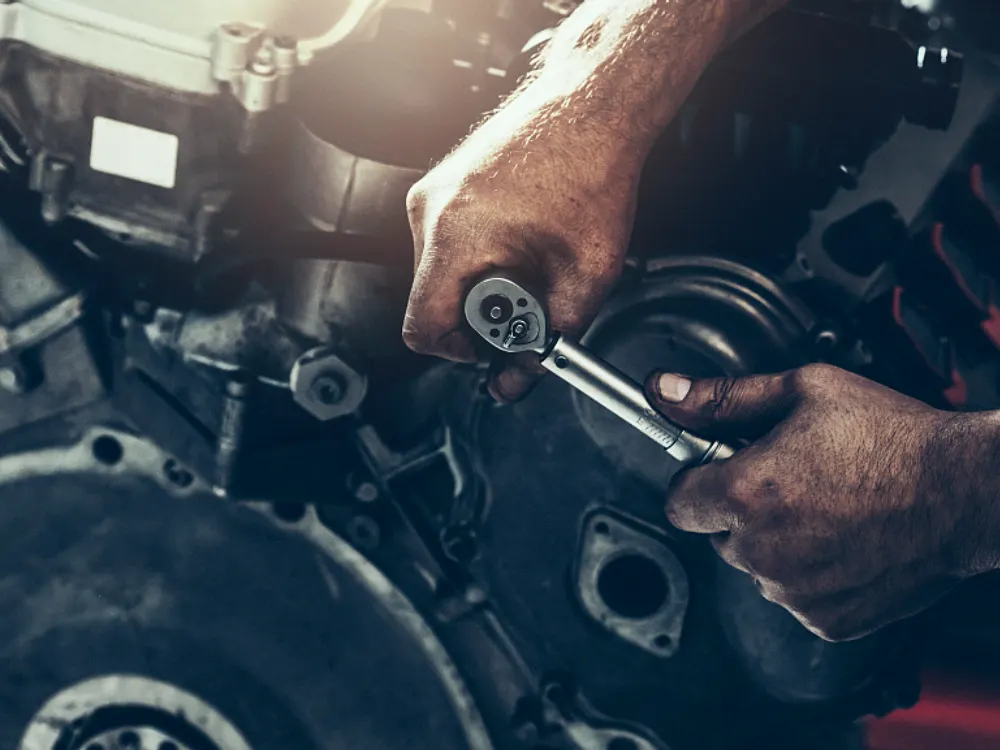
Introduction
A starter motor sits among the car’s most critical mechanical components. The engine operation only starts if a working starter system is in place.
An average car starter motor lasts up to 150,000 miles. Depending on your driving habits, engine design, and other factors, the part can either break prematurely or outlive your car.
In any case, you shouldn’t rely on a predetermined starter lifespan. Hence, it is important to understand how your starter works and the symptoms of its failure. Let’s discuss starter motors more below.
Starter Motor Working Principle
Different car types and models use varying car starter types. They slightly differ in some mechanics but still involve the basic parts of a starter motor. Nonetheless, the starter’s fundamental working principle can be narrowed down.
An electrical charge is sent to the starter system once you turn your key for ignition. The starter motor draws out energy from the main battery. This energy goes through the solenoid, which engages the pinion gear.
Since your starter motor eats up significant electrical energy, the solenoid also acts as a power relay. It closes electric circuits and directs the current to the starter motor. This ensures your car starter has enough power to crank the engine.
The pushed-out pinion gear then meshes and rotates the flywheel through the ring gear. The engine combustion initiates as the flywheel turns and sucks in fuel and air. This now completes your car ignition with the engine running.
Symptoms of a Bad Starter Motor
While a starter motor is not as big as other components, spotting signs of failure can be easy.
1. Unusual clicking sound
One solid sign that your starter is going bad is when you hear an unfamiliar clicking sound once you turn your key.
In fact, a clicking noise is the most common sign of a bad starter motor. A whirring or buzzing sound sometimes accompanies it. What happens here is that your motor isn’t getting enough power to engage.
A buzzing sound means your starter is locked up and won’t engage the ring gear. It’s either caused by a faulty battery or internal damage to the motor.
It is also likely that the cause of the clicking noise is a broken or missing gear tooth. You should immediately check under the hood as this can cause more serious damage.
2. Slow cranking
Slow cranking of the engine can also be caused by a dead or drained battery. But, it is also a sign of a bad solenoid. This can signify high resistance in the starter motor, resulting in slower flywheel rotation.
But when the engine doesn’t crank at all, the solenoid can be calling it quits. This scenario is not too common but remains a likely situation.
3. Free spinning
If you experience free spinning of the starter motor more often, it is a sign of a starter problem.
This is caused when the pinion gear won’t mesh with the ring gear due to a damaged Bendix drive.
The pinion gear may rotate, but it did not engage the flywheel to turn the engine over.
4. Working lights, dead engine
Your lights can turn on once you insert your key, even without the ignition. This is because your car devices can get power supply from the battery. It is clear that your car battery doesn’t have a problem, should this be the case.
So when your battery is safe, yet your engine is dead, your starter motor is likely causing the trouble. Your starter is likely to be dead since there is no response with the ignition key. When you have a completely dead starter motor, you’ll also get a completely dead engine.
5. Smoke and burn odor
No amount of effort can fire up your engine if the starter completely stops. But if you continue your attempt despite the broken starter, your engine can catch fire rather than fire up.
Pressing on with the ignition can cause your starter to overheat and burn.
Once you see smoke and smell a burning odor, it is time to replace the starter. You’ll likely need a full replacement rather than a repair.

Factors That Can Affect the Condition of Starter Motor
Since you’re now well aware of the signs of a damaged starter, you should also learn the factors that lead to it. Below are the round-ups of the most common factors that lead to a starter motor condition going south.
Poor installation
Any car component is vulnerable to breaking down if improperly installed. Poor installation of the starter means loose connections. Loose wirings can lead to insufficient power supply or short circuits.
If the motor isn’t properly bolted, the pinion gear can also be engaged inaccurately. Improper engagement and disengagement of the gears can lead to broken rods or gear teeth.
Corrosion
Metal components will corrode faster if often exposed to the elements. Water and soil are the most common nemesis of auto parts. They can remove the protective lubrication of components and speed up rusting.
It is important to regularly check for signs of corrosion around the starter motor. If you can avoid this problem, you don’t have to pay for repairs.
Extreme driving conditions
Driving within your car’s specified limits is safe for you and your components. Constant exposure to extreme heat or cold can affect the performance of your battery and starter. A problem with your battery can contribute to the failure of your starter motor.
Also, it is not a secret that extreme environments diminish a car’s longevity. Always drive within ideal conditions to save your components from unwanted issues.
Defective components
A car is an assembly of interconnected components. A defect in one part can cause failures of other components. This is especially true of the starter motor.
A dead battery is the most common defect that can cause the starter to fail. Pushing the starter to function with insufficient power will only damage it. As mentioned before, the starter needs significant power to crank the engine. Functioning below the ideal power output only exposes the motor or part to breakage.
Within the starter, it is also critical to check the solenoid for problems. This component also encounters failures. Running on a problematic solenoid means inviting damage to your starter motor.
Replacement Cost of Starter Motor
The cost per starter motor is dependent on several factors. You can opt for a refurbished, reliable motor at a much lower price. Starter motor replacement can also be done in your garage if you have the know-how. This further saves you from hefty labor costs when going for professional replacement.
The average cost for a starter motor ranges from $50 to $350. Brand-new starter motors often cost $80 to over $500 a piece for the most expensive brands. In addition to the cost of the parts, you’ll also pay a mechanic fee of at least $150.
Some compact cars are too compact that the replacement will involve getting the suspension out before reaching the motor. This further extends the replacement time and piles the labor cost. Overall, starter motor replacement can be a pricey venture.
Conclusion
The good thing about starter motors is that they don’t break down easily. They have longer service than other parts, which can be extended further with proper measures.
Still, despite their renowned longevity, keeping them in tip-top shape is imperative. Remember that any problem with the starter motor can only result in more problems. Running in ideal conditions and regularly checking your parts will go a long way.
Take the safe route to maintain your starter motor. It’s better to be extra careful than to stop in the middle of nowhere due to a problem you could have avoided in the first place.
